Even if you’re a coffee novice, you’ve likely heard about Kenyan coffee. Though it makes up less than 1% of the world’s coffee market, it has earned a noble reputation with coffee enthusiasts. Kenya’s third-highest export is coffee, making it a foundational product for the country’s economy. An average of 50,000 tons of Kenyan coffee is produced annually, thanks to the area’s warm climate and well-timed rainy seasons. Coffee beans are grown, harvested, and processed by approximately 250,000 workers in Kenya, most of which are small landholders.
Kenya’s beans are popular for gourmet varieties, as it is considered one of the highest quality cups worldwide. Some even refer to this java as the “connoisseurs cup” because of its smooth drinkability and rich, well-balanced flavors (more on that below.)
Fun fact: The people of Kenya produce coffee, but drink very little of it. Tea is the drink of choice for most Kenyans, so there’s more of their delicious coffee to go around.
If you’re trying to wean yourself off of milk and sugar, you may learn to love black coffee with Kenyan beans. The strong flavor may be too much for some, but the complex taste is nice for someone who likes a bold, layered profile.
When you drink Kenya coffee, you can expect:
- A strong, front of the palate flavor.
- A bright, vaguely floral aroma
- Lively acidic top notes of lemongrass
- Undertones of black currant and bergamot
- A pleasant weight that makes for its easy mouthfeel
- Dry, wine-like aftertaste
- Easy pairing with both sweet & savory food
So what gives Kenya’s beans their rich, complex flavor? There are many contributing factors to consider.
One major factor is altitude.
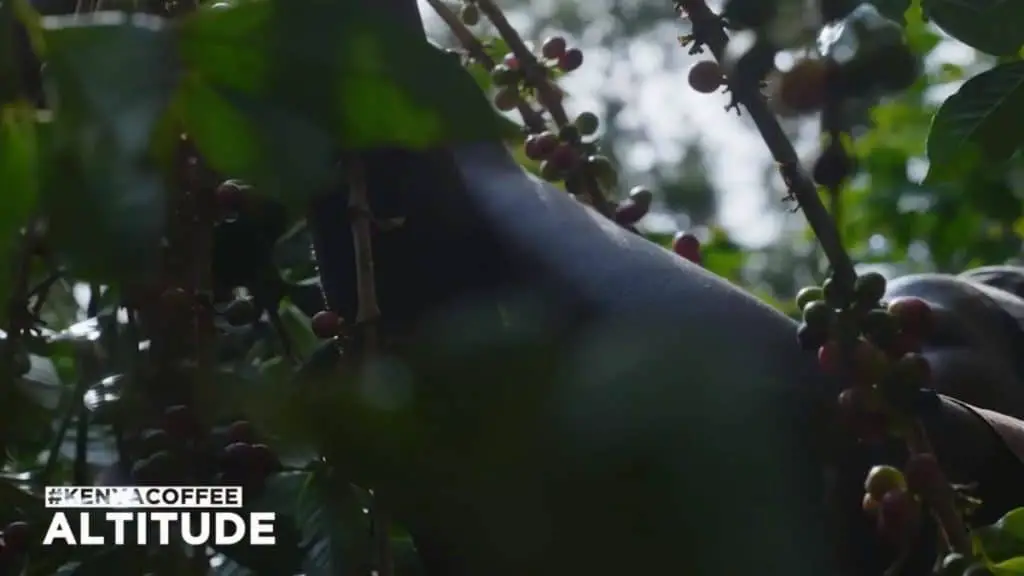
Kenyan coffee beans are certified SHG (strictly high growth) and SHB (strictly hard bean) status. To qualify, coffee beans must be elevated above 1300 meters or 4500 feet. Kenyan beans hit that quota and then some. Most of their coffee plantations are between 1400 to 2000 meters ( 4590 to 6500 feet) altitude, sometimes higher.
The higher the elevation, the slower a coffee plant will grow. This means less energy is spent on the reproductive cycle, and the plant focuses its attention on its beans, giving us a more robust final product. This, in combination with the great drainage at high altitudes, allows for a higher concentration of sugars in the bean.
These sugars are responsible for the berry flavors you’ll notice in a well-made cup of Kenyan coffee.
Kenyan coffee is also almost exclusively arabica.

Have you ever wondered why “100% Arabica beans” is such a point of pride for coffee makers? Broken down to basics, there are two types of coffee beans: Arabica and Robusta. While Robusta beans are hardy and easier to grow, but tend to have a flat, bitter taste when compared to their cousin Arabica. They’re often used for “filler” in blended coffees to drive down costs.
Kenya grows both varieties, but Arabica is more common to the area. The soil there tends to be fertile, volcanic, and loamy, which is ideal for these particular beans. More recently, Kenyan coffee farmers have been working on disease-resistant varieties of Arabica. Hopefully, this will make it easier to produce greater quantities of arabica coffee, no filler required.
Lastly, Kenyan coffee producers wet process their beans almost exclusively.
While a matter a personal preference, those who prefer wet-processed coffee like it for two main reasons:
The first is quality control. The first step in the wet (or “washed”) process involves soaking the coffee cherries. While the cherries soak, a natural sorting process occurs. Ripe beans sink to the bottom, while unripe cherries (along with any twigs/debris) will float to the top, allowing inferior beans to be skimmed away.
The second is that wet processing does more to preserve the natural flavor of the coffee. Wet processing maintains the acidity and particular tasting notes. A discerning palate will be able to tell exactly where a washed coffee bean is from, making it the choice processing method for single-origin coffees.
Now, let’s take a look at Kenya’s growing regions and how the coffees produced in them differ.
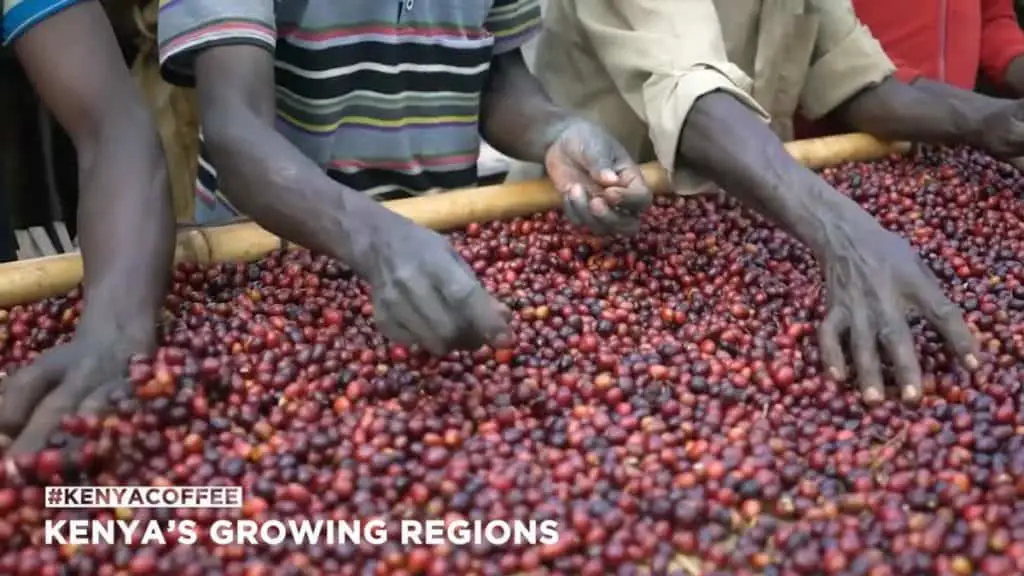
Table of Contents
Kenya’s Growing Regions
The Central Region
60% of Kenya’s coffee comes from its Central region which includes the Counties of Kiambu, Nyeri, Kirinyaga, and Muranga. This region is home to Mt. Kenya and the Aberdare Ranges, which are rich in that volcanic soil coffee trees tend to love.
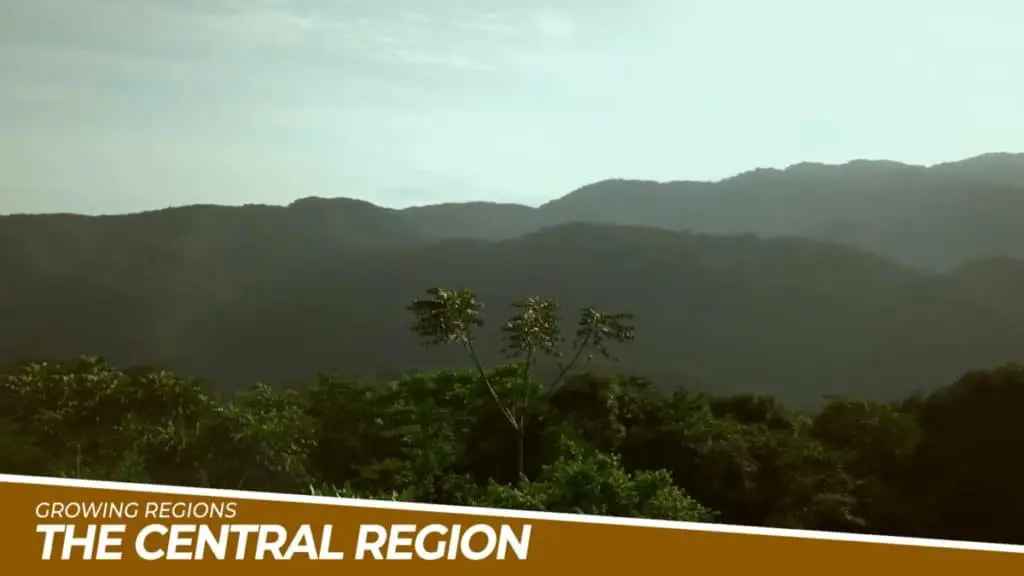
Most people associate Kenya’s coffee with the sharp, citrus top notes and chocolate berry undertones of Kirinyaga and Nyeri’s beans. In the rest of the Central Region, the acidity is a little more mellow.
The Western Region
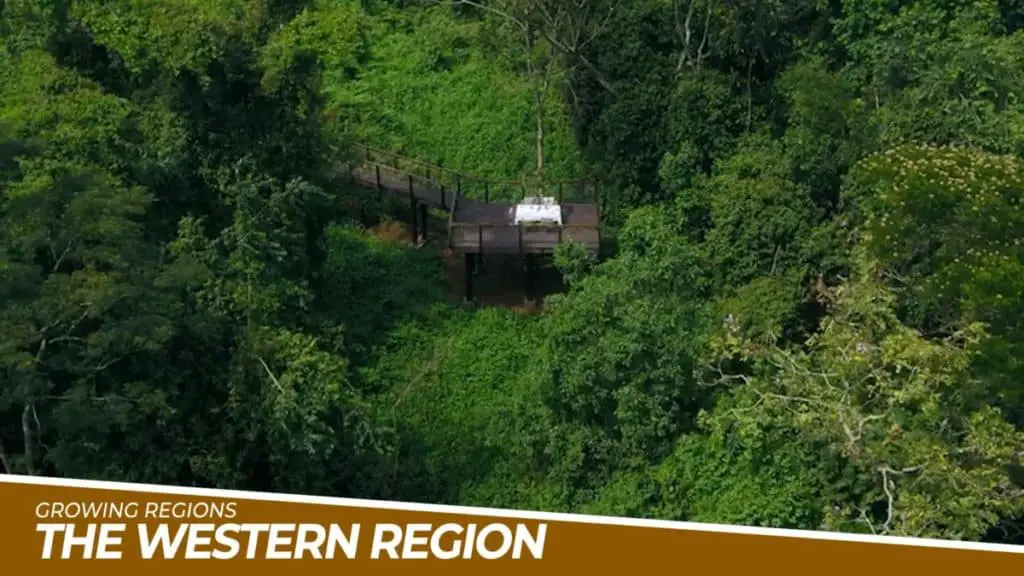
The West is home to Mt. Elgon, an extinct volcano that straddles the Uganda/Kenya border. This is where much of the Western Region’s coffee is grown. Other coffee growing Counties in the region include Vihiga and Kakamega.
Similar to above, the coffee from the West tends to have a full-bodied flavor with sharp citrus notes.
The Eastern Region
The Eastern Region of Kenya is drier, making it less plentiful than the above regions. Coffee is an important part of the economy in this area and grows well in the Mbooni, Kangundo, and Iveti Hills.
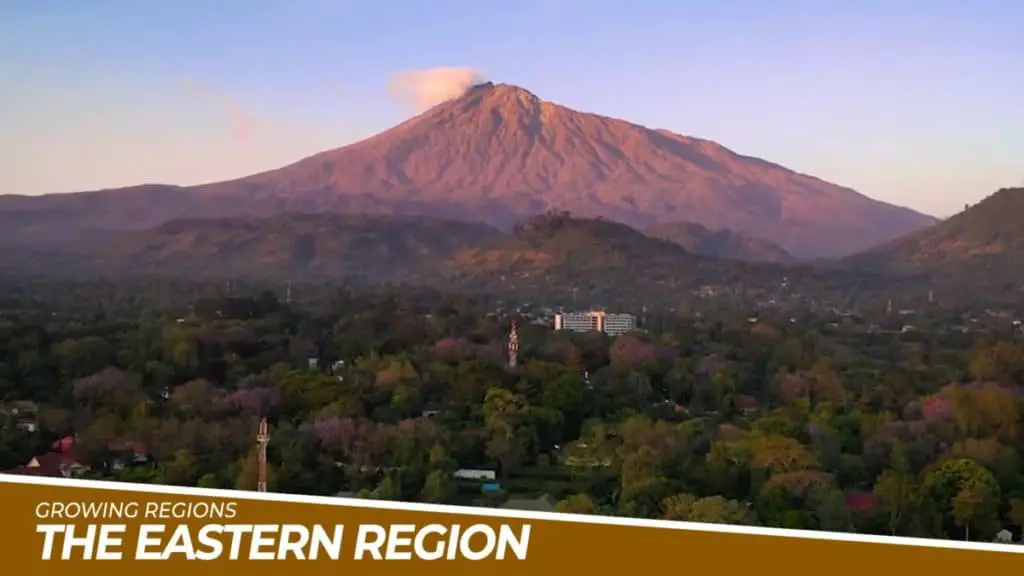
Coffee from this region is described as fruity with a silky mouthfeel.
The Nyanza Region
Conversely to the East, the Nyanza Region has regular rainfall and rich soil. This densely populated area includes the Counties Kisii, Nyamira, Kisumu, and Migori.
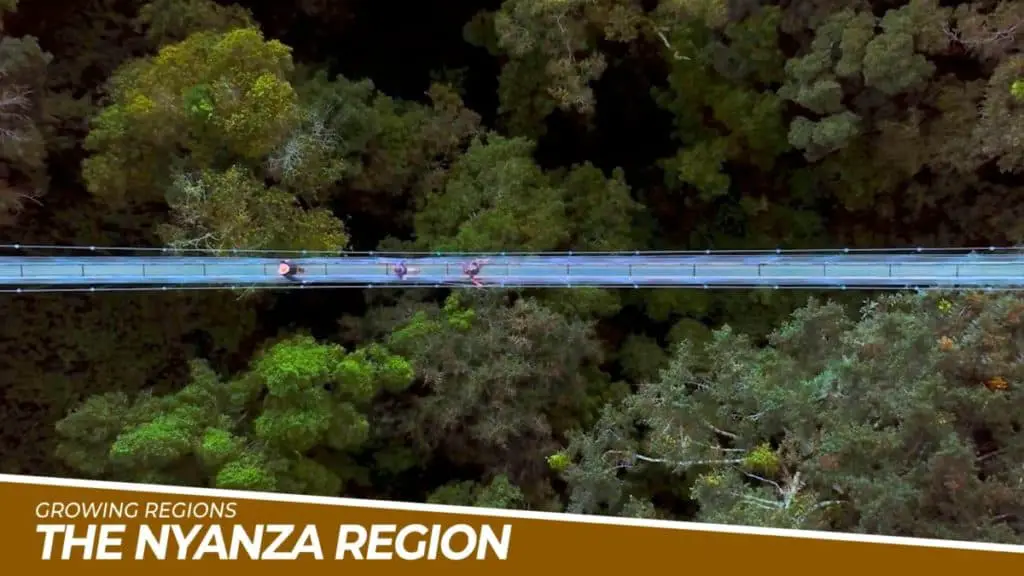
Coffee from this region is less pungent than other Kenyan varieties. It produces a sweet, creamy cup. Flavor notes are nutty with just a touch of fruit.
The Great Rift Valley Region
The Great Rift Valley is a vast space that runs North to South for 4000 miles, starting in Syria and extending to Mozambique. The highlands just West of the rift are perfect for coffee, with fertile soil and mild temperatures.

The coffee in the Rift Valley Region of Kenya has that signature Kenyan flavor, but the acidity is slightly less sharp than some varieties.
Kenyan Coffees to Try
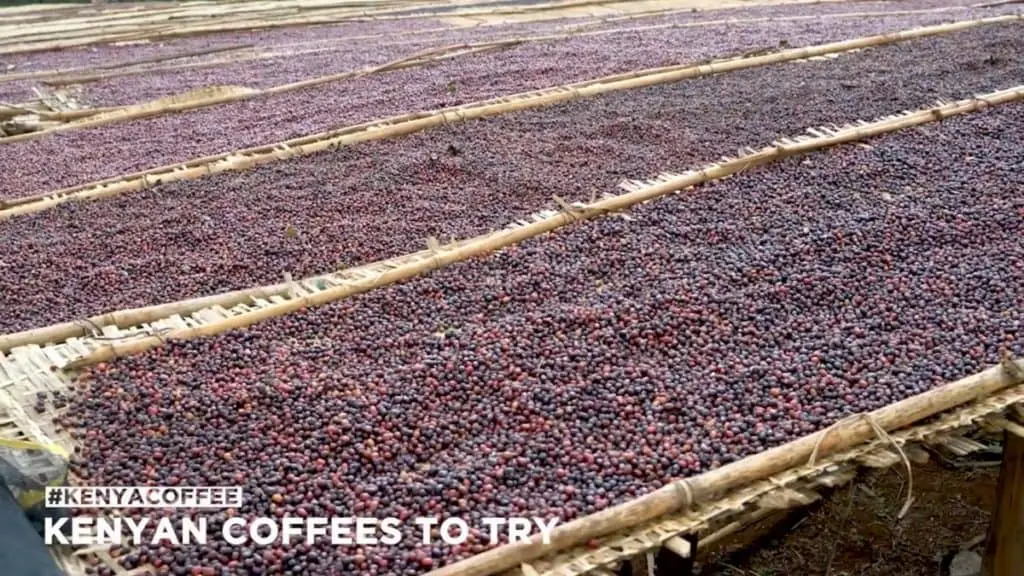
We could talk about coffee beans all day, but what’s the point if you can’t taste them? Here’s a quick guide to some of the best Kenyan coffee beans on the market today. We scoured the internet for highly-rated, accessible, ethically sourced, and most importantly delicious- Kenya beans.
Volcanica Kenya AA
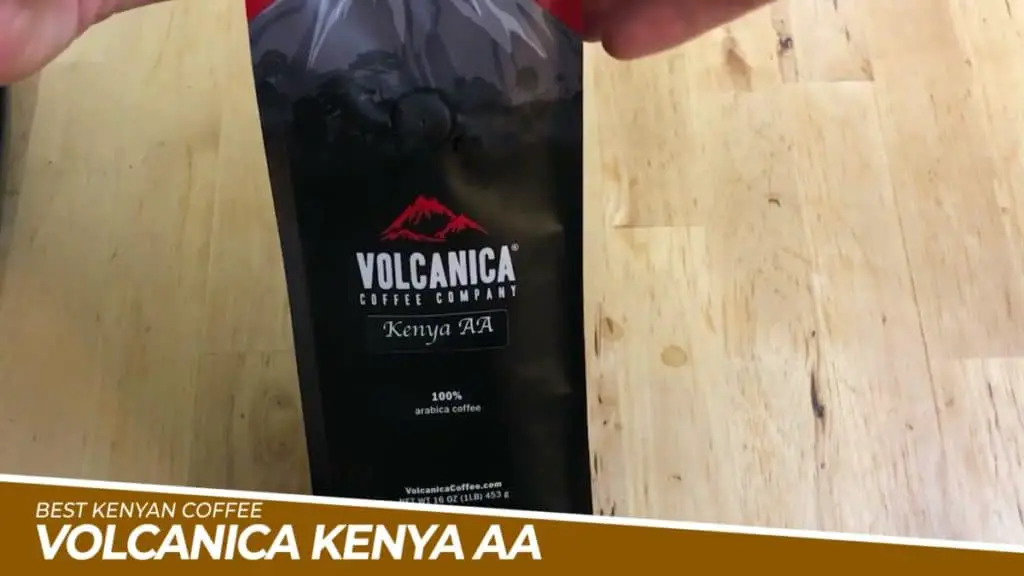
Kenya grades the quality of their beans on several factors before roasting them. They are then distributed at different price points based on their overall quality. AA beans are large, high quality, and have a sweet complex flavor.
Volcanica’s beans are at the top of everyone’s list because they’re 100% AA grade Arabica and 100% quality. They’re grown at the highest altitudes in the region- up to 6,800 feet.
This coffee is often praised for its complex flavor. It starts with a floral aroma, smacks you with a sweet and top note, tickles your tongue with tartness then surprises you with a savory edge.
Java House Kenya AA
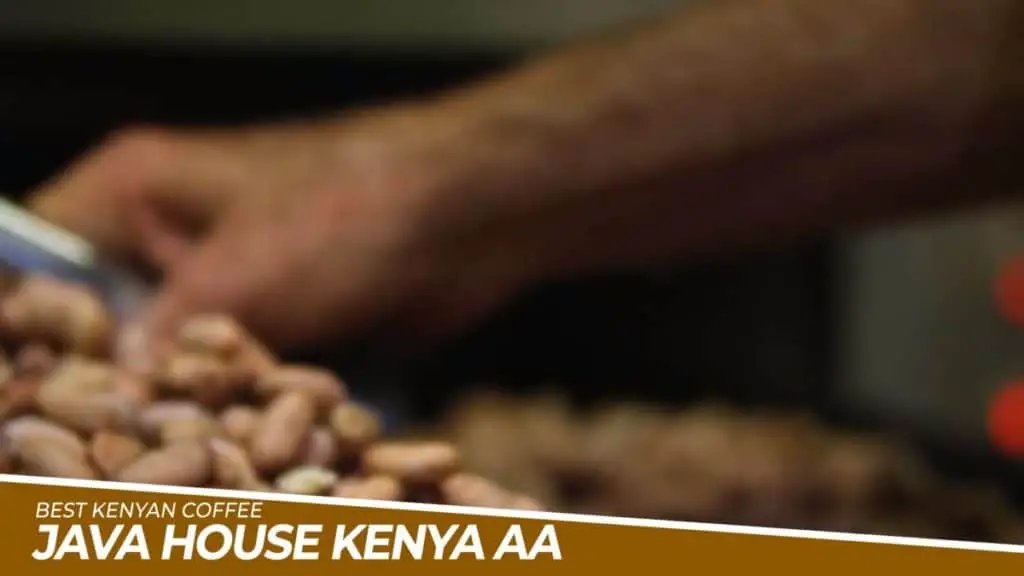
Java House is a café franchise that began in Nairobi, eventually spreading to multiple stores across Kenya, Uganda, and Rwanda. Their coffee is organic, fair trade, and single origin.
The company has 6 offerings for beans, their Kenya AA boasting that robust acidic taste from the highlands. Java House’s beans are roasted lightly when compared to other Kenyan coffees, so you’ll enjoy sweeter notes and a smooth finish.
Out of the Grey Kenyan AA

If you’re looking for a high-quality Kenyan coffee with a little special something, consider Out of the Grey’s Kenyan beans. This family-run small-batch coffee house, based in Fairview Pennsylvania, does things a little differently.
Their Kenyan AA beans boast floral notes with flavors of blackcurrant, fennel, and black tea. A curious combination, but the 5-star reviews on their website can’t be wrong. Not a fan of single-origin coffee? This company features custom blends, so you can customize to your heart’s content.
Screen 18 Kenya AA

Screen 18 has been in business for 75 years, so they must be doing something right! Referring to the screen size used to sift out the finest coffee beans, Miami, Florida based company Screen 18 is dedicated to serving up the best to loyal consumers and newcomers alike.
Their Kenya AA beans are a Medium to Dark roast with that full-bodied flavor and wine-like acidity signature to Kenya’s coffee.
Allegro Coffee Kenya Grand Cru Light Roast

Looking for all of the flavors of Kenya, but a little less bold? Check out this light roast from Allegro, a small company with a passionate dedication to ethical practices. Their Kenya Grand Cru beans come direct from small landholders in Nyeri.
This light roast isn’t light on taste, either. It allows some more subtle notes to come to the foreground, boasting flavors of red wine, currant, and blackberry with a soft finish.

